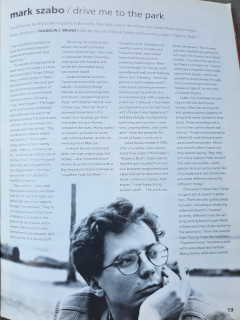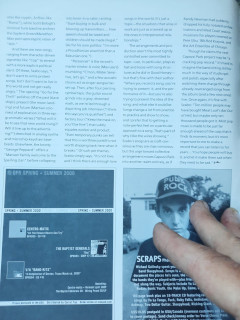
DRIVE ME TO THE PARK
Puncture Fall 2000
by Franklin J. Bruno
Good Horsey hardly made a splash in the early-’90s indie pool — but those who heard them never forgot them. And now? FRANKLIN J. BRUNO hails the return of Mark Szabo and his new project, Capozzi Park.
“The only other interview I’ve done for this album was with someone who assumed I had been a cop.” The speaker is singer/guitarist Mark Szabo. The subject is Chocolate Covered Bad Things (Catsup Plate), credited simply to ‘Mark,’ but performed for the most part by a still-developing version of Capozzi Park, his current band. And the evidence is his song “Cop,” which begins: “The happiest of men live their childhood dreams/Being a cop was mine,” before proposing that police spot criminals in the same way criminals spot potential victims: “The second nervous glance means they’re afraid.” Then it gets creepy, as the narrator calmly boasts, “Mellow, mellow as can be… I’m a hot cop, hottest cop on the disco floor.” (If you recognize these lines, appropriated from the Village People’s “Hot Cop,” give yourself a tin star and a handful of poppers.) The problem is, if you read this as autobiography, you’d also have to conclude that Szabo is a faded soap-opera star nagging her agent for residuals (“They’re running your seasons right now in Malaysia”), a soldier in the Kashmir border dispute, and a woman offering to lie to the authorities for a crooked ex. And that’s just the first-person stuff….
Of course, he’s none of the above; he’s a self-confessed “record-collector type” who lives in Vancouver, British Columbia, plays guitar left-handed, and writes the damnedest songs you’ve ever heard.Szabo kicked around the Vancouver scene with various bands — including Infernal Devices, a two-acoustic-guitars-and-drums “songwriting work-shop” with Stephen Wood, now of Destroyer [their CD Thief is reviewed elsewhere in this issue] — but his songs got their first wider airing in Horsey, formed in the early ’90s by Szabo (as bassist), guitarist/co-writer Justice [Schanfarber], and drummer/raconteur Max Lee.Infernal Devices disbanded after one tape and no gigs, but Horsey — later renamed Good Horsey to avoid confusion with a Bay Area band Szabo dismisses as “a gothier Faith No More” — released a clutch of singles and cassettes, mostly on their own Trackshun label, that veered from skeletal post-punk to clattering improvisation. Their one full-length CD, Kazue, is still available and well worth tracking down, but “Eleventy,” which appeared on both cassette and 7″, is the band’s defining moment — a nerve-jangling portrait of a manipulative brat with a taste for public sex. Colloquial (“Ever been punched when you’re high?/I just sort of knew it was happening”) and disturbingly unjudgemental, both song and narrator — unsavory, unsympathetic, and unreliable—form the template for much of Szabo’s work since.
Good Horsey ended in 1995, after a Canadian radio session and a final single (“Pink Pages”/”Emperor Nick”). Szabo denies that the split resulted from tension between songwriterly and experimental tendencies in the band — a tension Capozzi Park shares. “I was happy doing Justice’s stuff…. The work was good, he explains. “But it was a sad time, like having a girlfriend who says ‘I’m moving out in three months.’ You take it for what it is but there’s no hope in it.” (Justice continues to lead the more noise-centric Pork Queen, which ran parallel to Good Horsey through-out its existence and will soon release a triple LP, Isn’t it a Pity, on Ecstatic Peace).Szabo, too, had been recording on the side (with Good Horsey’s Max Lee, among others), producing two cassettes of songs that never clicked for that band. These recordings led in turn to the current album and line-up. “It was commissioned as a Mark CD, and the band grew up around that project. About two months after it came out. they started saying, ‘Hey, why isn’t this a Capozzi Park record?’ The next one will be — some people carry around a name like it’s a trademark, but sometimes you need different names for different things.”Chocolate Covered Bad Things is a portrait of a band in gestation. There are solo guitar pieces by Szabo, including a rendering of Bertolt Brecht’s “Swamp” (entirely different from the art-song setting Brecht’s post-Weill collaborator Hans Eisler wrote for the same lyric). There are reworkings of songs from the cassettes — “Daytime Emmy” becomes a duet with since-departed member Marcy Emery (who also contributes the cryptic, Softies-like “Rome”), while [Steve] Balogh’s minimal funk bassline anchors the Soylent Green/Marathon Man post-apocalyptic vision of “Ash.”

And there are new songs, ranging from character-driven vignettes like “Cop” to several with a more explicit political slant. Of these, Szabo says, “I don’t want to write protest songs, but I don’t want to live in this world and not get really angry.” The opening “Go for the Thrill” polishes off the past (slave ships), present (the moon landing) and future (Martian colonies) of exploration in three epigrammatic verses (“What will it be to see that new world rising?/ Will it live up to the advertising?”) drenched in analog synths and microchip-keychain laser blasts. Elsewhere, the knotty “George Peppard” offers a “Manson family welcome to the Spelling clan” before collapsing into loner-in-a-cabin ranting: “Start buying in bulk and blowing up transmitters… Free speech should be taxed and children should be made illegal.” (As for his own politics: “I’m more a Proudhonian anarchist than a Bakun[in]ian one.”) “Personnel” is the record’s master stroke: A voice (Max Lee’s) mumbling “C’mon, Mister Sensitive, let’s go,” and a few acoustic strums act as singer-songwriter set-up. Then, after four piercing cymbal taps, the guitar sound grinds into a gray, distorted wash, as we’re led through a dispiriting job interview (“I think this says you’re qualified”) and factory tour (“Keep the mask on, you’ll be fine”) that subtly equates worker and product: “Even temporary punks can tell that this is worthless junk/It’s not worth shipping back here when it breaks.” Of such pet themes. Szabo simply says, “It’s not love, and I think there are enough love songs in the world. It’s just a topic — the situations that arise in work are just as screwed up as the ones in interpersonal relationships.”
The arrangements and production aren’t the most tightly controlled ever committed to tape — Lee, in particular, plays as fast and loose with song structures as he did in Good Horsey — but that’s fine with their author. “When you record a song, you’re trying to present it, and the performance of it — but you’re also trying to present the idea of the song, and what else it could be. Songs change a lot from practice to practice and show to show, and I prefer that to getting a note-perfect feel on a particular approach to a song. That’s part of why I like the wires showing.” Szabo’s songs are as craft-conscious as they are class-conscious, but this urge toward collective arrangement moves Capozzi Park into another realm entirely, as if Randy Newman had suddenly dropped his fully notated orchestrations and West Coast session musicians for players weaned on Pere Ubu, ’80s Red Krayola, and the Art Ensemble of Chicago.
Though he claims the next Capozzi Park project may be “a cracking pop record,” it’s hard to imagine the band sitting still for much in the way of studio spit and polish, especially after watching them charge through already-rearranged songs from the album (and a few new ones) live. Once again, it’s fine with Szabo: “Ten million people may have bought Meat Loaf’s Bat Out of Hell, but maybe only ten thousand people got it. Most pop music is made to be just far enough ahead of the cusp that it finds its moment, but it’s more important to me to make a record that you can listen to for years….You hope people will buy it, and let it make them sad when they need to be sad.”
Listen to “Chocolate Covered Bad Things” by Mark here .
And Mark Szabo’s own bandcamp page here.